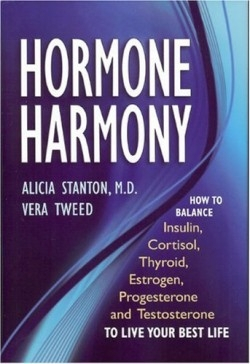Hormone Harmony
How to Balance Insulin, Cortisol, Thyroid, Estrogen, Progesterone, and Testosterone to Live Your Best Life
Because of recent research and the controversy that surrounds the risks of hormone replacement therapy for menopausal women, hormone imbalance has become a hot topic, but few straightforward, comprehensive guides have been written on the issue.
Hormone Harmony fills that gap with an in-depth look at how hormones are deeply connected to nutrition, lifestyle, and supplements. Most importantly, it provides a road map for women seeking to create hormone balance, providing a checklist of symptoms for identifying imbalances.
The authors possess high-level credentials: Alicia Stanton, M.D., is a specialist in preventative medicine and hormone imbalance, and serves as chief medical officer of BodyLogicMD, a network of physicians specializing in bioidentical hormone therapy. Co-author Vera Tweed, a veteran health writer, has written several books and is a contributing editor for Better Nutrition and other magazines.
What makes them both well-suited to pen such a comprehensive guide, though, isn’t just their experience in the medical field, but their personal journeys with hormones. Each shares the story of a dramatic medical event and how these health setbacks brought them to examine bioidentical hormones more closely. Stanton’s story begins with a heart-rending anecdote about waking up after back surgery, wondering if she’d live long enough to see her little son get his first grown-up haircut.
Hormone imbalance can be tricky to spot, they note, because the situation brings on multiple symptoms like sleep disturbance, weight gain, mood swings, and low energy. Although menopause is traditionally seen as the chief culprit for unbalanced hormone levels, Stanton and Tweed believe that imbalance can happen at any stage of life and can significantly impact a woman’s quality of life.
With diligence and wonderfully clear writing, the pair detail how hormones work, explaining issues like cortisol triggers and insulin resistance. That same straightforward, informative tone allows them to discuss other subjects like carbohydrates, strength-training, and antibacterial products.
The authors posit that healthy lifestyle changes and bioidentical hormones can restore balance, and their descriptions of even this medical terminology are clear: “To get an idea of the difference between hormones that are bioidentical and those that are not, imagine a jigsaw puzzle,” they write. “In a normal puzzle, the pieces will fit if you put them in the right places. That’s how bioidentical hormones work in our bodies; they fit.”
The book isn’t about popping pills to feel healthy, though; the authors delve deep into crucial topics like diet improvement, physical exercise, toxins, supplements, and stress. Each of these areas has an effect on how the body produces hormones, and how those hormones interact. Although the work is primarily addressed to women, they include a chapter for men, with the same type of lucid, solid suggestions for health.
Both bioidentical hormones and lifestyle shifts are complex areas, making this easy-to-digest guide particularly invaluable.
Disclosure: This article is not an endorsement, but a review. The publisher of this book provided free copies of the book and paid a small fee to have their book reviewed by a professional reviewer. Foreword Reviews and Clarion Reviews make no guarantee that the publisher will receive a positive review. Foreword Magazine, Inc. is disclosing this in accordance with the Federal Trade Commission’s 16 CFR, Part 255.

